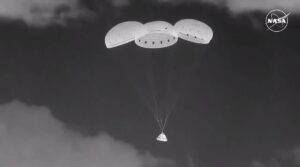NASA and Boeing safely returned the uncrewed Starliner spacecraft to Earth, landing at 12:01am ET on September 6th at White Sands Space Harbor in New Mexico, and concluding a three-month flight test to the International Space Station.
 Starliner now will ship to NASA’s Kennedy Space Center in Central Florida for inspection and processing.
Starliner now will ship to NASA’s Kennedy Space Center in Central Florida for inspection and processing.
“I am extremely proud of the work our collective team put into this entire flight test, and we are pleased to see Starliner’s safe return,” said Ken Bowersox, associate administrator, Space Operations Mission Directorate at NASA Headquarters in Washington. “Even though it was necessary to return the spacecraft uncrewed, NASA and Boeing learned an incredible amount about Starliner in the most extreme environment possible. NASA looks forward to our continued work with the Boeing team to proceed toward certification of Starliner for crew rotation missions to the space station.”
The flight on June 5th was the first time astronauts launched aboard the Starliner. It was the third orbital flight of the spacecraft, and its second return from the orbiting laboratory.
NASA’s Commercial Crew Program requires a spacecraft to fly a crewed test flight to prove the system is ready for regular flights to and from the orbiting laboratory. Following Starliner’s return, the agency will review all mission-related data.
NASA astronauts Butch Wilmore and Suni Williams launched on June 5th aboard Starliner for the agency’s Boeing Crewed Flight Test from Cape Canaveral Space Force Station in Central Florida. On June 6th, as Starliner approached the space station, NASA and Boeing identified helium leaks and experienced issues with the spacecraft’s reaction control thrusters.
Following weeks of in-space and ground testing, technical interchange meetings, and agency reviews, NASA made the decision to prioritize safety and return Starliner without its crew.
Wilmore and Williams will continue their work aboard station as part of the Expedition 71/72 crew, returning in February 2025 with the agency’s SpaceX Crew-9 mission.
“We are excited to have Starliner home safely. This was an important test flight for NASA in setting us up for future missions on the Starliner system,” said Steve Stich, manager of NASA’s Commercial Crew Program. “There was a lot of valuable learning that will enable our long-term success. I want to commend the entire team for their hard work and dedication over the past three months.”
The crew flight test is part of NASA’s Commercial Crew Program. The goal of NASA’s Commercial Crew Program is safe, reliable, and cost-effective transportation to and from the International Space Station and low Earth orbit. This already is providing additional research time and has increased the opportunity for discovery aboard humanity’s microgravity testbed, including helping NASA prepare for human exploration of the Moon and Mars.


